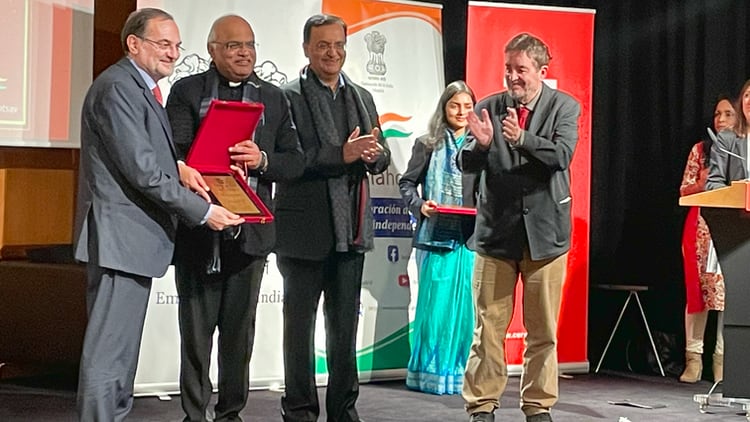Alberto Rubio
Doctor of Philosophy and Sanskrit Philology Óscar Pujol Riembau received last Wednesday the Distinguished Alumni Award from the Indian Council for Cultural Relations (ICCR) “for his outstanding contribution to the strengthening of ties between India and Spain”, at a ceremony held at the Cervantes Institute in Madrid.
Coinciding with the celebration of Vishwa Hindi Diwas (World Hindi Day), which commemorates the first time Hindi was spoken at the United Nations General Assembly in 1949, the event was attended by representatives of the ICCR, the Ministry of Foreign Affairs, Casa Asia, the Indian Embassy in Spain and Casa de la India, who expressed their appreciation to the awardee.
In his speech, Pujol expressed his gratitude to all the institutions represented “because they made this work possible to spread Indian culture in Spain and vice versa” and had words of recognition for all the “great pioneers” who began teaching Spanish in India and who laid the foundations “so that Spanish is now a favoured language that continues to grow and has a great future” in that country.
Óscar Pujol completed his bachelor’s, master’s and doctoral degrees in Sanskrit at the Benares Hindu University. He has taught Indian philosophy, Sanskrit, religion, culture and literature at prestigious universities in India, Spain, Brazil and Mexico. He collaborated in the creation of Casa Asia and in the setting up of the Instituto Cervantes in New Delhi. He was also Director of the Institute in Rio de Janeiro and is currently in charge of its headquarters in New Delhi. Among many other publications, he is the author of the Sanskrit-Catalan and Sanskrit-Spanish dictionaries.

Ambassador Dinesh K. Patnaik, who described the laureate as “a dear friend”, welcomed the strong cultural relationship between the two countries but added that “this is only the beginning” and expressed his desire to promote knowledge of the respective languages in both countries because “languages add to communication between countries”.
“Few people know”, he added as examples of the historic Spanish-Indian relationship, “that the master Francisco Casanovas composed the harmonies of the Indian national anthem (in collaboration with Rabindranath Tagore) and that, apparently, Isabel the Catholic changed chess, which came from India via the Arabs, to give a fundamental importance to a piece that did not exist in the original game: the queen”. “I hope we can do many more things together in the future,” he concluded.
The director of the Cervantes Institute, Luis García Montero, expressed his satisfaction “because Óscar, in addition to working for the dissemination of Spanish culture in India, has known that travel is a two-way street and has spread his love of Indian culture throughout Catalonia and Spain”. García Montero took the opportunity to emphasise that “of all the extensive network of the Cervantes Institute, the centre in New Delhi is the one that has the highest number of enrolments each year“, and he said he was committed to continuing to promote the prominence “that Spanish wants to have in India and the legacy of the Indian tradition” in Spain.
The President of the Indian Council for Cultural Relations (ICCR), Vinay Sahasrabuddhe, who travelled expressly from New Delhi to attend the event, stressed that Pujol’s work, both in the preparation of both dictionaries and in the establishment of the Instituto Cervantes in India, “are an example for everyone” and constitute a “true cultural bridge between the two countries“. For this reason, he added, “we have to maintain this momentum and also increase India’s cultural presence in Spain”.








